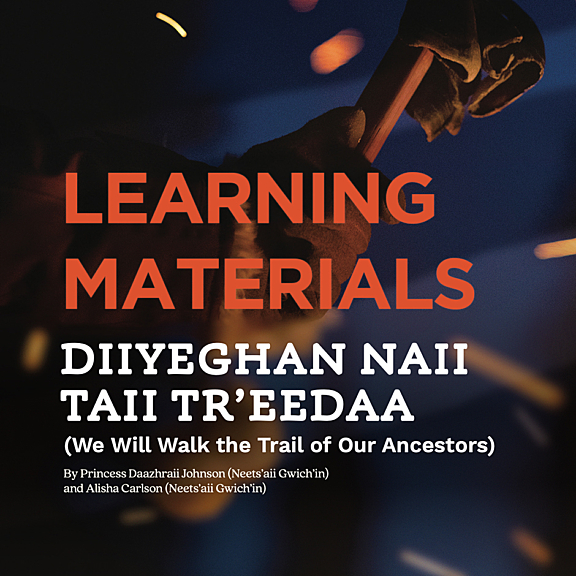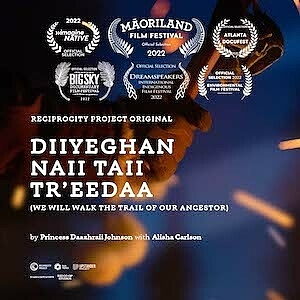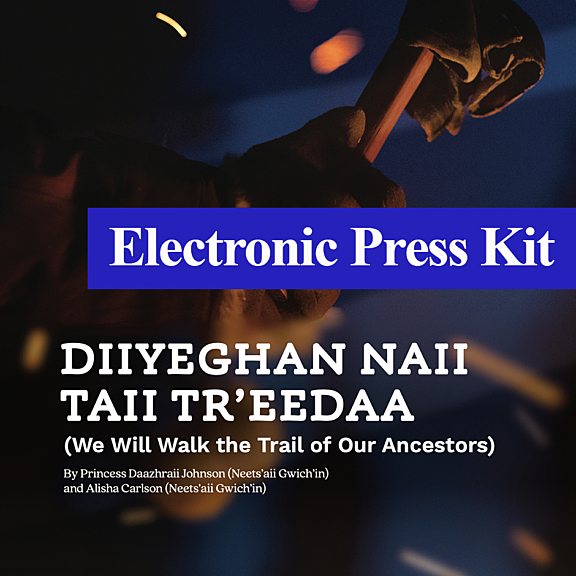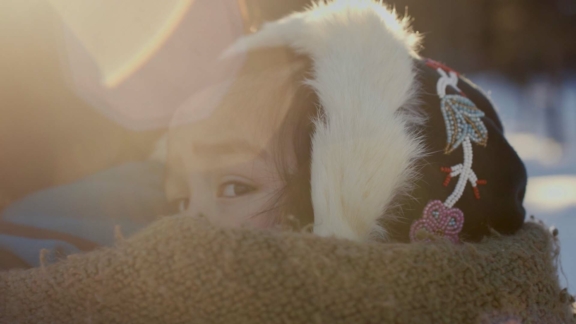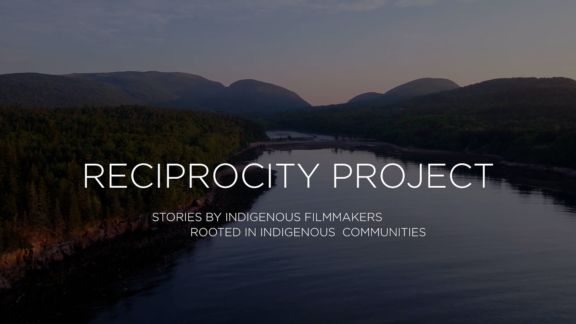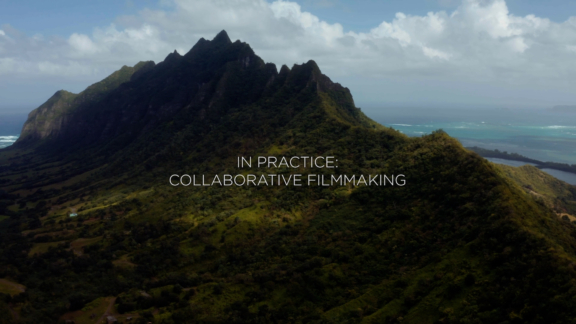2022 | Film 6 MIN. | Gwich'in
Diiyeghan naii Taii Tr’eedaa
(We Will Walk the Trail of our Ancestors)
Princess Daazhraii Johnson with Alisha Carlson (Gwich'in)
A grandfather teaches his granddaughter, a young Gwich'in mother named Alisha, how reciprocity is embedded in all aspects of life. The northern lights warm the caribou; the caribou helps feed and sustain the community; the community honors the connections. Each element in nature is purposeful and related. In turn, these connections bring new meaning to Alisha and her wishes for her children and for all living beings.
See the making of video here.
LEARNING MATERIALS & DOWNLOADS
It was an honor to explore alongside members of our community, not only the theme of 'Reciprocity' but what it means to be a Gwich'in person and our connection to the vadzaih (caribou). We come from a heavily documented community in regards to our work keeping the calving grounds of the Porcupine Caribou Herd safe from oil development in the Arctic National Wildlife Refuge, yet it is challenging to relay the nature of our spiritual relationship to the vadzaih and to all life.

Through the use of the Gwich'in language and visuals created by our own perspective, we are able to better express this relationship. We are fortunate to have the teachings of our Ancestors and our Elders to guide us. Listening to Rev. Trimble Gilbert's voice and wisdom, we hope that our audience is also able to reflect on what it means to be a human being and what values we are passing along to future generations. May we all be guided to restore balance with ourselves, one another, and our beautiful Mother Earth.
In this visually stunning film, we are drawn into the beauty of the Arctic homelands of the Gwich'in people. The filmmakers give viewers a glimpse of Gwich’in culture through the window of the Gwich’in language and for them this film is a deliberate act of language protection for the benefit of the Gwich’in people. Alisha’s daughter Gracie is one of four Gwich’in children to be enrolled in the Tanan Ch’at’oh language immersion school, revitalizing the language. Viewers are introduced to filmmaker Princess Daazhraii Johnson and to Alisha Carlson, who is a proud mother of two beautiful Athabascan children. Alisha’s grandfather is a traditional chief, and a practitioner of the ancient land-based Gwich’in traditions. In the film, Alisha says
I’ll always remember my grandfather’s stories about what it means to be a Gwichin person.
We want our children to live like our Ancestors.
She shares what she has been taught about their sacred connection to the caribou (“vadzaih”).
We eat the caribou and we also know them. And the caribou know us as humans too. We really have knowledge of them. And so we live off of them. We also dream of the caribou.
The elder teaches younger community members how to butcher a caribou and how to disperse the meat. We see the interspersing of images that link the migration of the caribou with Alisha walking along a trail with her baby. In this manner, the filmmakers accentuate the Ancestral and on-going connection between the caribou and the Gwich’in people. The food systems are continuous--the health of the caribou, the blueberries, and other traditional foods all depend upon the overall health of their waters, the land, and air. From nursing caribou, to Alisha nursing her daughter, Gracie, we see these rich nutrients, which come directly from the land, being passed along to the next generation. These images help relay a timeless cycle of reciprocity between humans and their relatives in the natural world.
Grandfather talks about the Gwich’in sharing culture, which revolves around their relationship with vadzaih.
Unto this day, we are still taking care of each other and we plan for the future by ensuring the young people now understand this sharing culture. And it is for this purpose that I talk to you now. What we are doing now…. people who are growing up now have never heard this. If you learn this well then you will teach the children.
In this way, the generations are connected to each other through the life of vadzaih and its power to sustain the lives of the Gwich’in people.
In Gwich’in, reciprocity is enacted at the center of community life. Through language we learn that, like other Indigenous cultures, the word “reciprocity” has no direct translation into a single Gwich’in word but rather it is embedded in the values of the Gwich’in culture. Most if not all Indigenous languages are verb-based as opposed to English, which is noun-based. Reciprocity is enacted in the handing down of cultural traditions to younger generations. Despite the cultural disruptions Gwich’in have endured through colonialism (which includes threats to other traditional foods like Chinook salmon, aka King salmon), Gwich’in people still take care of each other through their culture of sharing, and it is by teaching it to children that they ensure its survival.
- What meaning does the film’s title, Diiyeghanaii Taii Tr'eedaa (We Will Walk the Trail of our Ancestors), have for you?
- In what ways is reciprocity central to the story told in this film?
- How would you describe the relationship between the Gwich’in language, culture, and subsistence way of life? What role does the Porcupine Caribou Herd play in this relationship?
- What did you notice in the film about how Gwich’in people use all parts of the caribou they hunt?
- The potential destruction and desecration of the caribou’s calving grounds by the oil industry will have a profound impact on Gwich’in people. Can you see yourself standing in solidarity with Gwich’in, whose survival depends on the caribou as a main source of food, medicine, and cultural continuity?
- What do you think may be the impact of freezing rain, severe drought, melting permafrost and other signs of climate disruption on the Porcupine Caribou Herd and Gwich’in people?
- How does the unique perspective and lens of the filmmakers as members of their community differ from other films that may have been made by outsiders?
- If you have an opportunity to speak with someone about this film, from your heart to theirs, what would you want them to know and what would you want them to do?
- Molly of Denali educator resources
- Seedcast episode with Alisha and Princess talking about Gwich’in language
- Tanan Ch’at’oh, Gwich'in language immersion school
- https://www.nativemovement.org/
- https://www.nativemovement.org/alaska-just-transition
- On The Land: this podcast brings you the voices of Indigenous People in this time of political and climate insecurity. They tackle difficult discussions on who has access to land, water, and air and offer a contemporary understanding of what it means to be Indigenous and live in relation to what is often known as the “outdoors” or “the wild.” (Alaska Native host)
- Coffee & Quaq: a podcast to celebrate and explore contemporary Native life in urban Alaska. (Alaska Native host)
- For information about the impact of mining and oil rigs and harmful chemicals on air, water, and food, and human health in Alaska and how to protect from exposure, see Alaska Community Action on Toxics
- Alaska Native Knowledge Network
- Craig Mishler and Kenneth Frank, The Man Who Became a Caribou (Hanover, New Hampshire: IPI Press, 2020).
- Gwich’in Steering Committee website
- Campaigns to protect Arctic National Wildlife Refuge
- Collapse of King Salmon runs in Alaska
- SEEDCAST: Storytelling is Guardianship
September 22, 2021 - South Seattle Emerald - Two Gwich'in filmmakers tell us about a special project they made in the language
November 11, 2022 - CBC - Northwind with Wanda McLeod - Gwich’in language on full display in new documentary on reciprocity
November 17, 2022 - APTN - Gwich’in-language short film explores connection with land in award-nominated series
December 10, 2022 - RCI Radio Canada International
Making of Videos & Trailer
Behind the Scenes

Alisha 'Diinashii' Carlson and daughter

Director, Princess Daazhraii Johnson, and Director of Photography, Maya Salganek, discuss filming
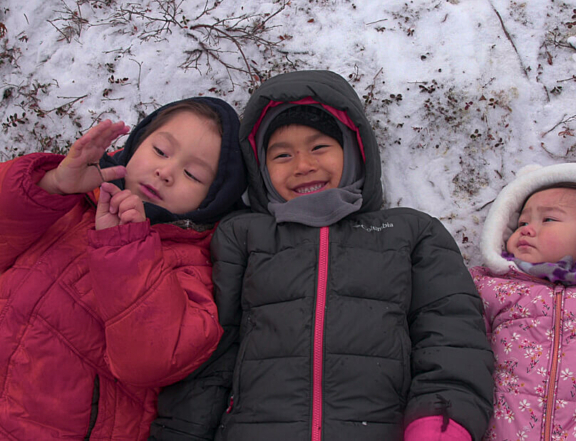
Children laying in the snow
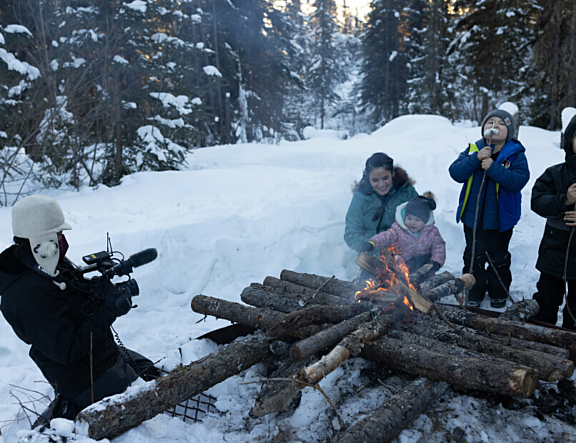
Filming Alisha and her family roasting marshmallows
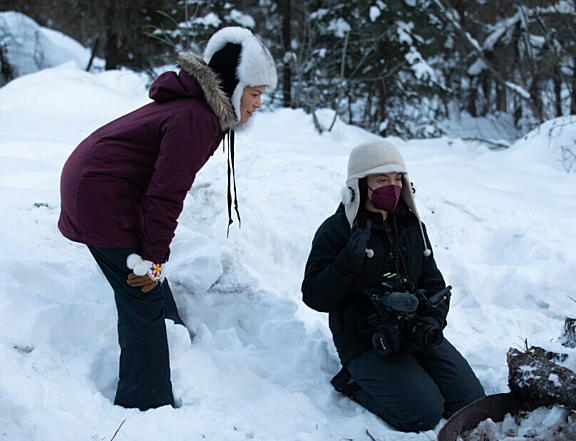
Director of Photography, Maya Salganek, films a scene by the fire
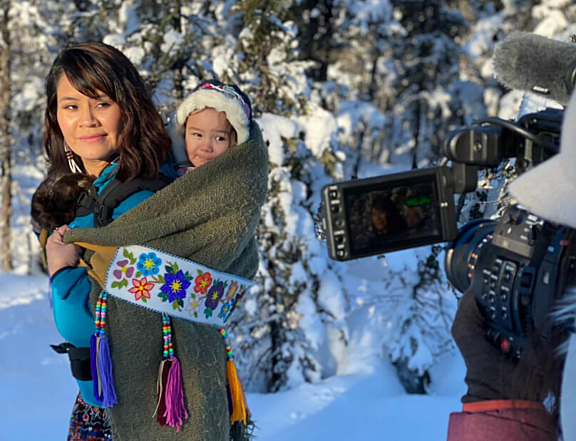
Behind the scenes shot Alisha 'Diinashii' Carlson and daughter

December 10, 2022
RCI Radio Canada International
Gwich’in-language short film explores connection with land in award-nominated series
Read articleNovember 17, 2022
APTN News
Gwich’in language on full display in new documentary on reciprocity
Read articleNovember 11, 2022
CBC - Northwind with Wanda McLeod
Two Gwich'in filmmakers tell us about a special project they made in the language
Read articleCritical acclaim for this film
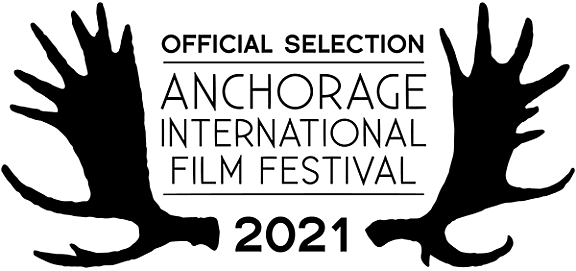
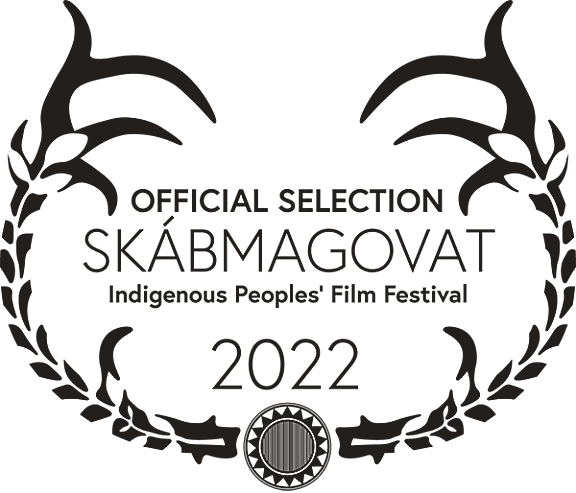
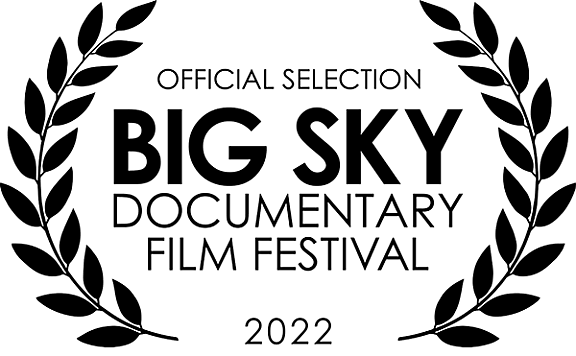
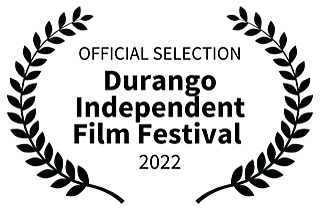
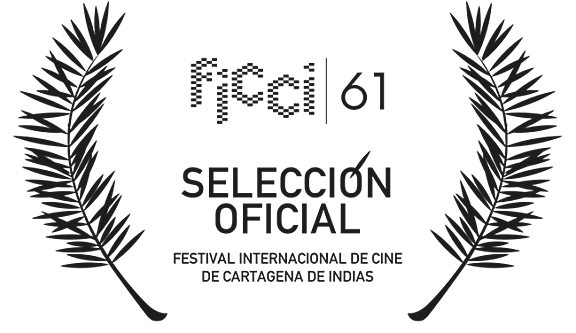

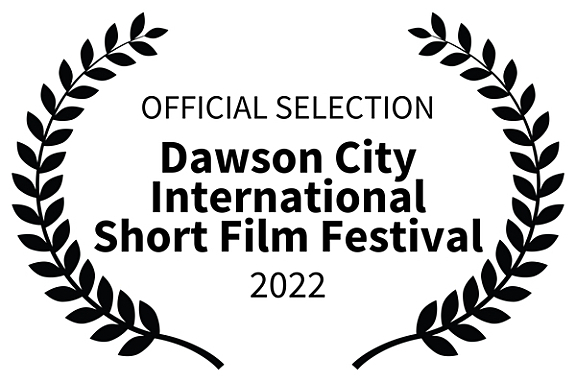
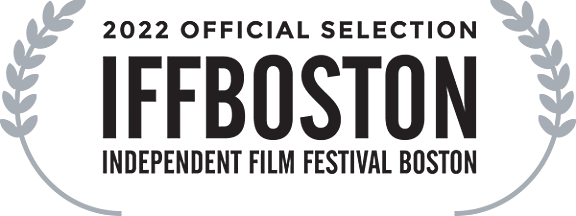


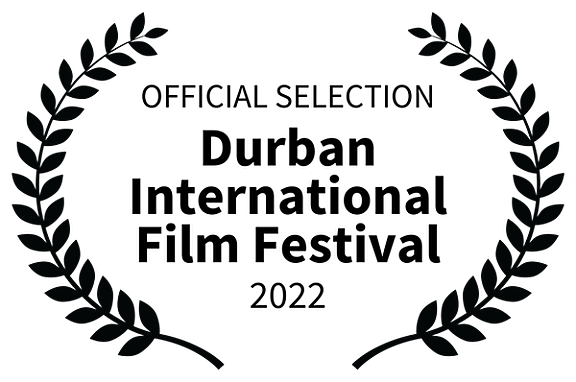
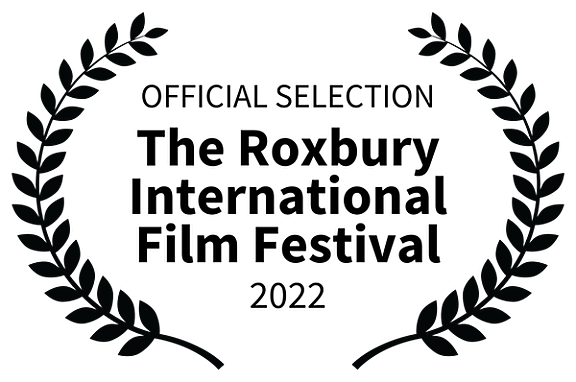

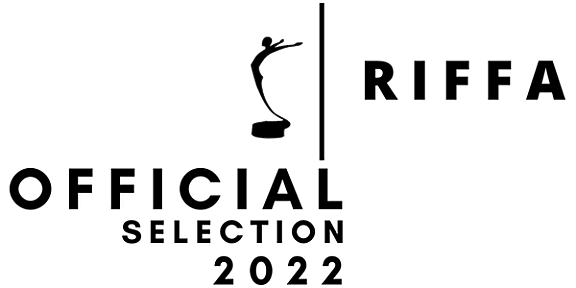
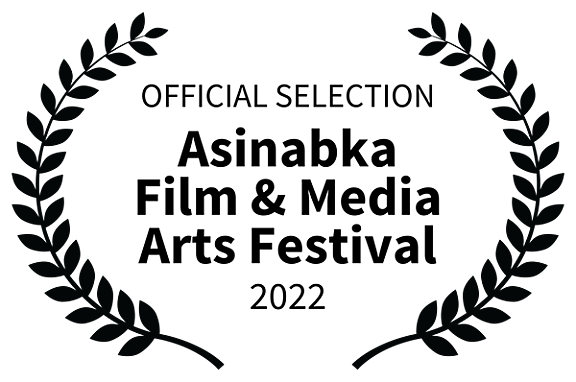

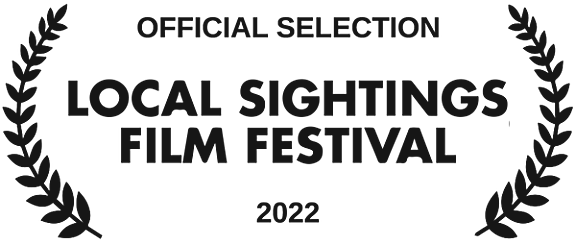

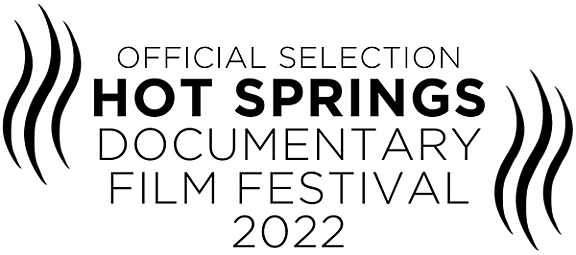

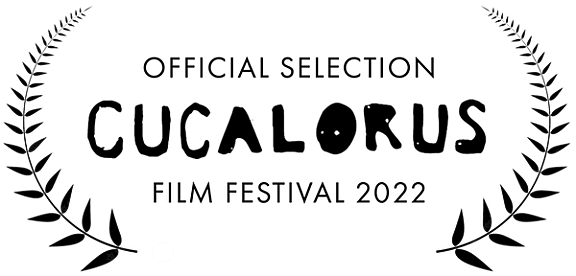

“This film is a prime example of Indigenous narrative power. It’s message connects the dots between the struggle to protect the land and the fight to preserve Gwich’in heritage and culture. It’s so good!“
- Dallas Goldtooth, Environmental Activist

